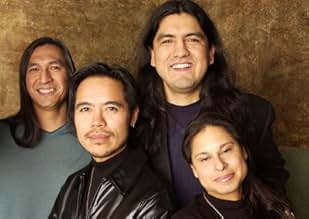Ajouter une intrigue dans votre langueSeymour Polatkin is a successful, gay Native American poet from Spokane who confronts his past when he returns to his childhood home on the reservation to attend the funeral of a dear friend... Tout lireSeymour Polatkin is a successful, gay Native American poet from Spokane who confronts his past when he returns to his childhood home on the reservation to attend the funeral of a dear friend.Seymour Polatkin is a successful, gay Native American poet from Spokane who confronts his past when he returns to his childhood home on the reservation to attend the funeral of a dear friend.
- Prix
- 8 victoires et 1 nomination au total
- Salmon Girl
- (as Jennifer Kreisberg)
Histoire
Le saviez-vous
- Citations
Seymour Polatkin: I deserved a better life than I was born into. But I made it better with nobody's help, including shit from you. And I got no help from any of these goddamn Indians here. I had to do it myself.
Aristotle Joseph: You write about these goddamn Indians! Telling me you did it yourself! These Indians that you write about, they're helping you every day, each and every one of them; every house, every story, every poem. They're helping you. Telling me you had nobody. We've been helping you since you were born.
- Générique farfeluA film by at least 62 people, Indigenous and otherwise.
Seymour Poltakin (the very talented Evan Adams) is a famous poet who happens to be both Native American and gay. He is called back to his Reservation in Spokane, Washington for the funeral of his childhood friend Mouse (Swil Kanim) only to confront all of the reasons he has left the Reservation for the 'white man's world' where he has found both financial and emotional success. Seymour's best friend Aristotle (Gene Tagaban) had originally left the Reservation to go to college with Seymour, but quickly soured to the prejudiced outside world and returned to his Reservation and to an unfortunate life of alcoholism and drug abuse. The bulk of the storyline revolves around how these two once devoted friends parted ways, the philosophies of each are explored, and though Seymour finds moments of love in his home space, he is still content to return to his white man lover and his life he has chosen.
There are many very tender and moving moments in this film: when Seymour is in conversation with Agnes (Michelle St. John) and when Agnes intones the Indian chants and songs at the funeral; Seymour's dialogues with his lover; scenes of quiet while Aristotle abuses himself with drugs; the weaving in and out of the beautiful dancing that flows through the film. The problem with the movie is the disparity of approaches in telling the story: an interview situation between Rebecca Carroll and Evan Adams is well written but breaks the mood of the poetic form of the story. The film is obviously low budget and in this case, for this viewer, the rough hand-held camera technique adds a quality of reality to what we are watching.
The overall effect at the end of the film is a pang of pain in the heart having witnessed the generations of 'isolation' and the segregation of the Native Americans into spaces both geographical and sociological that have undermined a tremendously valuable asset to our history. That role of shame is one that will never leave us, and it is a gift that artists like Sherman Alexie can bring this to the public's attention. Recommended. Grady Harp
- gradyharp
- 29 oct. 2005
- Lien permanent
Meilleurs choix
Détails
Box-office
- Budget
- 200 000 $ US (estimation)
- Brut – États-Unis et Canada
- 175 710 $ US
- Fin de semaine d'ouverture – États-Unis et Canada
- 12 709 $ US
- 12 mai 2002
- Brut – à l'échelle mondiale
- 175 710 $ US
Contribuer à cette page























